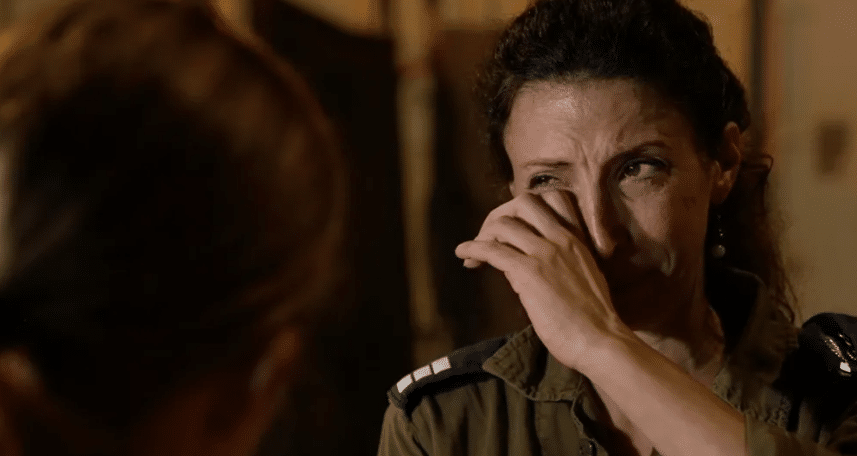The BBC has seen and heard evidence of rape, sexual violence and mutilation of women during the 7 October Hamas attacks.
Several people involved in collecting and identifying the bodies of those killed in the attack told us they had seen multiple signs of sexual assault, including broken pelvises, bruises, cuts and tears, and that the victims ranged from children and teenagers to pensioners.
Video testimony of an eyewitness at the Nova music festival, shown to journalists by Israeli police, detailed the gang rape, mutilation and execution of one victim.
Videos of naked and bloodied women filmed by Hamas on the day of the attack, and photographs of bodies taken at the sites afterwards, suggest that women were sexually targeted by their attackers.
[The BBC News Report continues]
In the video, the woman known as Witness S mimes the attackers picking up and passing the victim from one to another.
“She was alive,” the witness says. “She was bleeding from her back.”
She goes on to detail how the men cut off parts of the victim’s body during the assault.
“They sliced her breast and threw it on the street,” she says. “They were playing with it.”
[The BBC News Report continues]
A statement he made through a support organisation describes it as “inhuman”.
“Some women were raped before they were dead, some raped while injured, and some were already dead when the terrorists raped their lifeless bodies,” his statement says. “I desperately wanted to help, but there was nothing I could do.”
Police say they have “multiple” eye-witness accounts of sexual assault, but wouldn’t give any more clarification on how many. When we spoke to them, they hadn’t yet interviewed any surviving victims.
Hamas has rejected Israel’s accusation that its men sexually assaulted women during the attacks.
Israel’s Women’s Empowerment Minister, May Golan, told the BBC that a few victims of rape or sexual assault had survived the attacks, and that they were all currently receiving psychiatric treatment.
“But very, very few. The majority were brutally murdered,” she said. “They aren’t able to talk – not with me, and not to anyone from the government [or] from the media.”
[The BBC News Report continues]
“I spoke with at least three girls who are now hospitalised for a very hard psychiatric situation because of the rapes they watched,” Minister May Golan told me. “They pretended to be dead and they watched it, and heard everything. And they can’t deal with it.”
Israel’s police chief Yaacov Shabtai said that many survivors of the attacks were finding it difficult to talk and that he thought some of them would never testify about what they saw or experienced.
“Eighteen young men and women have been hospitalised in mental health hospitals because they could no longer function,” he said.
Others are reportedly suicidal. One of those working with the teams around survivors told the BBC that some had already killed themselves.
[The BBC News Report continues]
Hundreds of bodies were collected from the attack sites by volunteers.
Investigators admit that in those first chaotic days after the attacks, with some areas still active combat zones, opportunities to carefully document the crime scenes, or take forensic evidence, were limited or missed.
“For the first five days, we still had terrorists on the ground in Israel,” May Golan said. “And there were hundreds, hundreds of bodies everywhere. They were burned, they were without organs, they were butchered completely.”
“This was a mass casualty event,” police spokesman Dean Elsdunne told journalists at a briefing.
“The first thing was to work on identifying the victims, not necessarily on crime scene investigation. People were waiting to hear what happened to their loved ones.”
[The BBC News Report continues]
Teams here told us they’d seen clear evidence of rape and sexual violence on the bodies coming in, including broken pelvises from sustained violent abuse.
“We see women of all ages,” one of the reservists on the forensic team, Captain Maayan, told the BBC. “We see rape victims. We see women who have been through violation. We have pathologists and we see the bruises, we learn about the cuts and tears, and we know they have been sexually abused.”
I ask her what proportion of the bodies she’s handled show signs of this.
“Abundant,” she said. “Abundant amount of women and girls of all ages.”
The number of victims is hard to define, partly because of the state of the bodies.
[The BBC News Report continues]
“We see definite patterns,” she told me. “So it wasn’t incidental, it wasn’t random. They came with a clear order. It was […] rape as genocide.”
Avigayil agrees there were similarities in the violence visited on the bodies that arrived at the Shura base.
“There are patterns in that groups of women from the same place were treated in a similar manner,” she said.
“There might be a set of women who were raped in one way, and we’re seeing similarities in the bodies; and then a different set that were not raped but shot multiple times in the exact same pattern. So it seems that different groups of terrorists had different forms of cruelty.”
“This was a premeditative, systematic event,” police chief Yaacov Shabtai told journalists.
David Katz from Israel’s cyber crime unit which is involved in the investigation, told journalists that it was too early to prove that sexual violence was planned as part of the attack, but that data extracted from the phones of the Hamas attackers suggested that “everything was systematic”.
“It would be reckless to say we can already prove it […] but everything that was done there was done systematically,” he said. “Nothing happened by coincidence. Rape was systematic.”
[The BBC News Report continues]
“Israel on 7 October is not the same country that woke up the following morning,” said police chief Yaacov Shabtai.
Amid the horror of what happened to women here, Captain Maayan from the Shura identification unit says the hardest moments are when she sees “the mascara on their eyelashes, or the earrings they put on that morning”.
I ask where that lands in her, as a woman.
“Terror,” she replied. “It terrorises us.”

